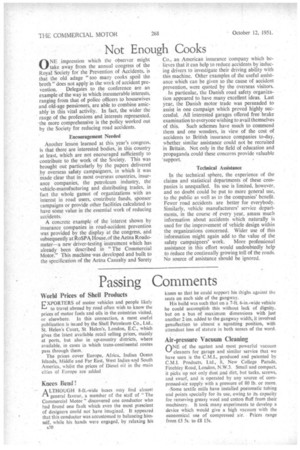Not Enough Cooks
Page 32

If you've noticed an error in this article please click here to report it so we can fix it.
ONE impression which the observer might take away from the annual congress of the Royal Society for the Prevention of Accidents, is that the old adage "too many cooks spoil the broth" does not apply in the work of accident pre vention. Delegates to the conference are an example of the way in which innumerable interests, ranging from that of police officers to housewives and old-age pensioners, are able to combine amicably in this vital activity. In fact, the wider the range of the professions and interests represented, 'the more comprehensive is the policy worked out by the Society for reducing road accidents.
Encouragement Needed Another lesson learned at this year's congress, is that there are interested bodies, in this country at least, which are not encouraged sufficiently to contribute to the work of the Society. This was brought out particularly by the papers delivered by overseas safety campaigners, in which it was Made clear that in most overseas countries, insurance companies, the petroleum industry, the vehicle-manufacturing and distributing trades, in fact the whole gamut of organizations with an interest in road users, contribute funds, sponsor campaigns or provide other facilities calculated to have some value in the essential work of reducing accidents.
A concrete example of the interest shown by insurance companies in road-accident prevention was provided by the display at the congress, and subsequently at RoSPA House, of the Aetna Roadometer—a new driver-testing instrument which has already been described in "The Commercial Motor.' This maehine was developed and built to the specification of the Aetna Casualty and Surety Co., an American insurance company which believes that it can help to reduce accidents by inducing drivers to investigate their driving ability with this machine. Other examples of the useful assistance which can be given to the cause of accident prevention, were quoted by the overseas visitors.
In particular, the Danish road safety organization appeared to have many excellent ideas. Last year, the Danish motor trade was persuaded to assist in one campaign which proved highly successful. All interested garages offered free brake examination to everyone wishing to avail themselves of this. Such schemes have much to commend them and one wonders, in view of the cost of accidents to British insurance companies to-day, whether similar assistancecould not be recruited in Britain. Not only in the field of education and propaganda could these concerns provide valuable 'support.
Technical Assistance In the technical sphere, the experience of the claims and statistical departments of these companies is unequalled. Its use is limited, however, and no doubt could be put to more general use, to the public as well as to the companies' benefit. Fewer road accidents are better for everybody. Similarly, vehicle manufacturers' service departments, in the course of every year, amass much information about accidents which naturally is used for the improvement of vehicle design within the organizations concerned. Wider use of this information might again add to the value of the safety campaigners' work. More professional assistance in this effort would undoubtedly help to feduce the continually growing toll of the roads. No source of assistance should be ignored.




















































































